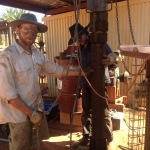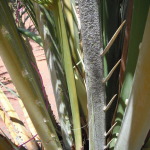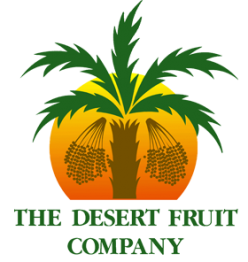Water

Although dates are very drought tolerant, they require a lot of water to fruit at a commercial rate. We use drip irrigation around the base of each palm which is pumped from our bore using a diesel generator. Ultimately, we would like to redesign our irrigation system to enable us to use a solar array to pump water – stay tuned for updates!
This year, we have created basins around the palms to ensure that irrigation water remains in the root zone of the palms and is not lost flowing onto inter-rows. Catching water in the basins also helps water penetrate deeper into the soil rather than remaining on the surface and assists us in monitoring surface salts which occur when evaporation is high.
Soils and fertiliser
Every year, we remove tonnes of organic material, nutrient and carbon from our soils and palms in the form of dates and dead foliage. A basic level of orchard sustainability requires that what is removed is replaced. This year we used gypsum to promote root development and unlock more nutrients for the palms, fish emulsion to provide a nitrogen and micro nutrient boost for the palms and potassium sulphate to promote healthy flower growth. We are experimenting with mixtures of compost teas, rock dust, mulch and humus.
Pests

Unfortunately we have a leaf scale in our orchard called parlatoria scale. This is the only major pest we face in the Northern Territory date industry. Scales are insects which suck sap from plant leaves, robbing them of essential nutrients and reducing the overall health of the plant. We try to minimise the impact of scale by spraying the palms each winter before the date flowers emerge, with a organically approved white oil. The white oil basically smothers the scale and limits their growth. We are also trialling selected nutrients to feed the palms to strengthen their internal resistance to parlatoria.
Organic Certification
We are not currently certified organic. However, we are 100% committed to sustainable, biological, organic farming and improving the life of our soils for the long term.
We will be seeking to gain certification from the relevant organic bodies in the near future!


try looking into Bio Char it fixes carbon into the soil, also Aloe vera sprays can be effective against sucking insects, im not sure if you can get ladybirds to live in the climate but could be worth looking into